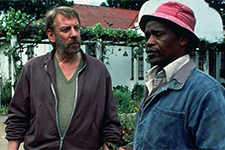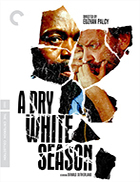A Dry White Season
|  There is a tendency to think of 1980s cinema as a particularly vacuous period in which hyped high-concept blockbusters completely took over, obliterating the artistic and ideological gains of the previous decade’s more daring filmmakers. And, while it is true that producers and executives did start to pull hard on the reins of overtly political and controversial filmmakers, especially in the wake of the financial and critical disaster that was Michael Cimino’s Heaven’s Gate (1980), the Reagan era is nevertheless quite extraordinary for the number of major films tackling difficult political subjects that played widely in theaters: Roland Joffé’s The Killing Fields (1984), a British production distributed in the U.S. by Warner Bros., dramatized the horrors of Pol Pot’s “Year Zero” cleansing campaign in Cambodia; Oliver Stone’s independently produced Salvador (1986) depicted the political instabilities and violence in El Salvador, while his Oscar-winning Platoon (1986) dared to take on the Vietnam War at ground level; and Richard Attenborough’s Cry Freedom (1987), another British production distributed by Universal, depicted a white South African journalist investigating the death of an anti-apartheid activist while in police custody. One of the most unique and intriguing of this era’s historical-political films is A Dry White Season, an adaptation of Afrikaner André P. Brink’s 1979 novel about a white South African teacher’s growing awareness of the horrors of apartheid and his commiserate political awakening at the expense of his family and professional security (not surprisingly, the book was banned in South Africa, although Brink managed to distribute it there through underground channels). It was a rare Hollywood production to take on apartheid, and it was also the first Hollywood film of any kind to be directed by a black woman, in this case Euzhan Palcy, who was born in Martinique in the French West Indies. Not being a native of South Africa, she nevertheless immersed herself in research, seeking to create as authentic a portrait as possible of what was happening with the minority white population and its subjugation of black Africans. Palcy, who was a protégé of François Truffaut’s, had directed only one previous feature, Sugar Cane Alley (Rue cases nègres, 1983), which was set in her native Martinique in the 1930s. Tackling A Dry White Season, which had been kicking around several Hollywood studios for the better part of a decade, was a major undertaking, but she embraced the challenge, casting both major Hollywood actors (Donald Sutherland, Susan Sarandon, and Marlon Brando, who she coaxed out of a 9-year retirement) and native South Africans (Zakes Mokae, Winston Ntshona, Thoko Ntshinga). The result is a fascinating, engrossing account of radical injustice that pulls few punches, but also holds out hope that the world can be made a better place (as it turned out, this was the last Hollywood film about apartheid before legal segregation ended in South Africa in the early 1990s). The story is set in 1976, the year of the Soweto uprising in which students gathered and protested the use of Afrikaans as the only language of instruction. The film depicts the march in the streets of Soweto and the subsequent massacre in which the police opened fired on the unarmed protestors, killing dozens of men, women, and children. Dozens, if not hundreds, more are swept up by the police, including the son of Gordon (Winston Ntshona), who works as a gardener for Ben du Toit (Donald Sutherland), a secondary teacher who was helping Gordon’s son attend his private school. Ben is a decent, but fundamentally complacent man who genuinely believes that the South African government is fair and just (when Gordon’s son is brutally caned by the police, he is sure that he must have done something to deserve it). Ben begins asking more questions when it is discovered that Gordon’s son died in police custody and his body buried in secret; he begins asking even more questions when Gordon is suddenly arrested and also dies in police custody. We know the truth because we see Gordon being tortured by the sadistic Captain Stolz (Jürgen Prochnow), so when we see Ben going through official channels like a good citizen, taking at face value that explanations given to him by corrupt officials, we know it is all a ruse. Ben begins to see through it all when he aligns with Stanley (Zakes Mokae), an activist friend of Gordon’s, and Melanie (Susan Sarandon), a British investigative journalist. Soon, he has become dedicated to bringing justice to Gordon and his family, first through a human rights lawyer named McKenzie (Marlon Brando) who knows they have no case, but takes it on anyway if only to demonstrate to Ben just how deeply rotten the system has become. Ben’s dedication to achieving justice eventually costs him his family, as his wife, Susan (Janet Suzman), refuses to join his crusade and instead resents him for the trouble it brings down on them personally and professionally. In some ways, A Dry White Season wears its agenda a bit too openly on its sleeve, as its depictions of good and evil are so stark in their clarity that they risk becoming caricatures (Prochnow’s Captain Stolz, in particular, is glaringly despicable and apparently incapable of being anything other than a relentless sadist). Yet, the dramatic stakes are such that anything less would risk underselling the poisonous extent of apartheid and how it had turned the very notion of justice in South Africa into a cruel joke. The courtroom drama, which unfolds around the film’s midpoint, is particularly infuriating, as we see McKenzie laying out in clear, indisputable terms how the law was betrayed and still losing in spectacular fashion. The truth, it turns out, does not matter because the truth threatens the system, and A Dry White Season is at its best in dramatizing in clear, humane terms how such a system oppresses and destroys basic humanity. Ben du Toit is a convenient point of identification for a traditional Hollywood audience who might have been unaware of—or indifferent to—the plight of black Africans living under apartheid (in this regard the film is yet another entry in the long line of Hollywood productions about foreign cultures that requires a white face in the lead, although it makes sense given its dramatic agenda of depicting a political and moral awakening). By the time the film has run its course, there is no question about the brutality of the South African regime and the lengths to which it would go to ensure that the white minority maintained its power. For that reason alone, A Dry White Season is an essential film of its time.
Copyright © 2018 James Kendrick Thoughts? E-mail James Kendrick All images copyright © MGM / 20th Century Fox Home Entertainment / The Criterion Collection | |||||||||||||||||||||||||||||||
Overall Rating: 


 (3.5)
(3.5)


